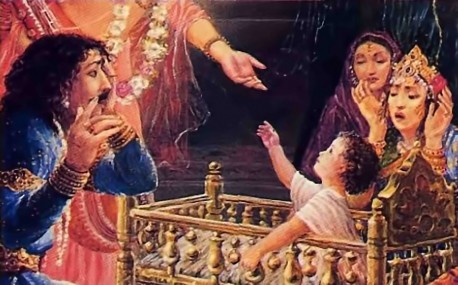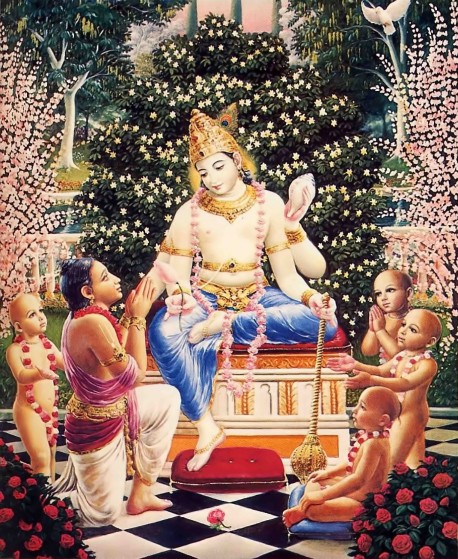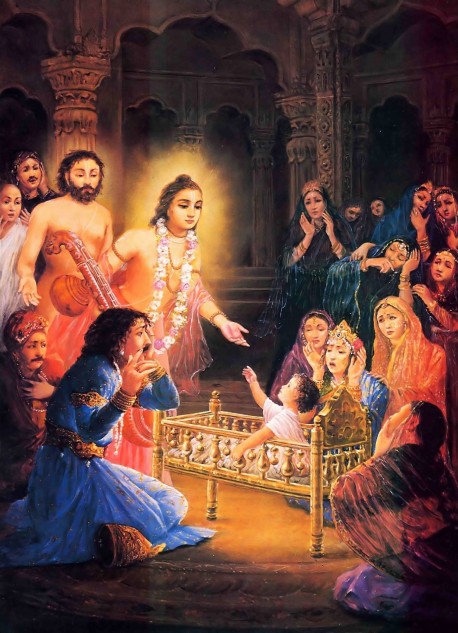The king had many wives, but,
strangely, he couldn’t have a son.
What happened when he finally
got one was even more strange.
There’s a saying that parents live on through their children. How often we hear, for instance, about a father telling his son, “You’ll be greater than I was,” or, “You should finish what I started.” But, ages ago, the great King Citraketu felt like dying—he could not have a son.
Otherwise, while King Citraketu ruled the earth everything went beautifully. Fruit trees hung low with their juicy yield, luscious vegetables crowded the fields, the mountains were generous with their gems and minerals, and the seas provided pearls. For his own part, the king seemed to have everything that anybody could want: youth, good looks, intelligence, wealth. And he had many Queens, all of them with lovely faces and enchanting eyes—and all of them barren.
Yes, Citraketu had everything, except what he wanted most. A son would not only carry on the dynasty but also offer sacrifices to the demigods and insure his parents’ heavenly reward. As Citraketu looked to the future, he was brokenhearted. Not one of his other blessings could make him happy.
Then, one day, the king’s life took a strange turn. The great sage Angira was traveling through the universe, and by his sweet will he came to the royal palace.
When Angira walked into the throne room, Citraketu got up from his throne and bowed. The king knew that his visitor was a great guru. He praised Angira with well-chosen words, washed his feet, and fed him with the finest foods. Citraketu served the holy man personally, performing his duty as a humble host to a guest of the highest spiritual wisdom. When Angira had finished eating and was relaxing on a richly decorated seat, the king humbly sat at his feet. Then Angira began to speak.
“My dear king,” he said, “I hope that your kingdom is peaceful and that all your people are feeling well. But I can see that you are not happy yourself. Your face tells me that you are not satisfied with your life; there is a goal that you desire but have not yet reached. Who is to blame? Are you at fault, or have others kept you from success? Please tell me—your pale face reflects a deep anxiety in your heart.”
“O Angira, great master,” King Citraketu answered, “you can understand everything about people who are bound by the laws of this material world. So you must also know why I am brokenhearted. You have perfect vision because you are so determined and pure. Still, you have asked me to tell you why I am anxious. Since you have asked, I will answer.
“Yes, I have fallen short of my life’s goal. Just as a hungry person cannot feel satisfied by being garlanded with flowers, I cannot feel satisfied by having a great empire and many possessions. My misery is this: I have no son. Please, O high-minded sage, save me and save my family. Please do something so that I may have a son.”
The transcendentalist Angira had no business fulfilling ordinary material desires, but out of his kindness he did not turn the king away. Drawing on his mystic power, he took some rice boiled in milk and sugar, offered it in a ritual to a demigod named Tvasta, and then gave it to Citraketu’s favorite queen—Krtadyuti.
“Now,” the sage told the king, “you will have a son—a son who will bring you both joy and sadness.” Without waiting for an answer, Angira left the palace.
Trusting the sage’s word, Citraketu conceived a child in the womb of Krtadyuti. And, to everyone’s amazement, in time she gave birth to a son. When they heard the news, all the citizens were overjoyed for their king.
After bathing and dressing himself in gorgeously ornamented robes, Citraketu asked the royal priests to bless the newborn child and perform the birth ceremony as the holy scriptures directed. Then, rejoicing, he gave gifts to the priests—gold, silver, clothing, jewels, villages, horses, elephants, and cows. Finally, just as a rain cloud freely waters everything (even the mountains and the oceans), the king lavished his riches upon everyone present. In that way he hoped to spread the good name of the new prince.
With the king’s hopes now fulfilled after so much frustration, his love for the little child grew day by day. And, naturally, his love for the boy’s mother Queen Krtadyuti also grew.
Not surprisingly, as Krtadyuti became more and more happy, the other queens became more and more hateful. As time went by, the king hardly cared about them, and they burned with envy. They, too, wanted to have sons, but they couldn’t. Only Krtadyuti had gotten the sage’s blessing, and the other queens cried bitterly to each other.
“If a wife has no sons, she has nothing but sadness.”
“Her husband neglects her.”
“Her co-wives insult her and treat her like a maidservant.”
“Such a woman is condemned in every way.”
“Even the husband’s maidservants receive his compliments; they have nothing to regret. But we are now the maidservants of the maidservants—we are the most wretched.”
Unable to stand their pain, the queens lost all common sense. They went mad, and at last they plotted to murder the baby. One day, when the mother and the nurse were both out of the baby’s room, some of the queens entered silently and put poison into his mouth.
In another wing of the palace. Queen Krtadyuti called out, “Nurse, bring the young prince to me. I think he’s been sleeping long enough.”
When the nurse went to the child’s room and approached his bed, she saw that his eyes were turned upward. Shocked, she looked closer and saw that he wasn’t breathing, that his heartbeat had stopped, that he was dead. “I am doomed!” she cried, striking her bosom with both hands and sobbing loudly.
When the queen heard the shrieking, she ran in. The nurse, struck with grief, was lying by the bed. As Krtadyuti neared her child, her dress and hair and mind were in disarray. On seeing the upturned eyes and the lifeless limbs, she fainted and fell next to the nurse.

Many others in the palace heard the screams, and they came to the prince’s bedroom—some hastily, others hesitantly. At the sight of the dead baby, none of them could hold back their tears. Even the murderous queens made their way through the door; they made a show of weeping along with the others.
When someone told the king what had happened, he nearly went blind. Grief set his mind aflame, and he stumbled through the palace hallways toward his son’s room, slipping and falling countless times along the way. Half-delirious, he lurched through the crowded doorway to the tragic scene. Surrounded by his ministers, royal officers, and priests, he got a glimpse of his dead boy and could not contain himself any longer. Shaking and disheveled, he fell unconscious at the child’s feet.
Shortly, Citraketu regained his senses. He tried to speak, but he was breathing too heavily for the words to come out. Through his tears he saw Queen Krtadyuti next to him, leaning against the bed. The garland of flowers that had decorated her hair was slipping down to the floor. Tears mixed with mascara traced gray lines down her face and stained her dress. She refused to leave her dead child, and as she looked at the baby’s body she cried like a sad songbird. Then, growing bitter, she raised her eyes upward and screamed.
“O God! You are useless! You have a law that a son can die only after his father dies. Yet You have let my son die while his father is still living. You may say that You don’t remember that law, and You may say that birth and death take place on account of our own activities. But I say that out of cruelty You have broken Your own law! If we are so powerful that we can bring on birth and death, then who needs God?!
“Or if You say that there must be a God because there must be someone to run things, I am not impressed. You may be God, but You are not intelligent—You make parents love their child so that they will raise him nicely, but then You take away the child. Now everyone will neglect their children. You are not very smart!”
Trembling, the queen turned again to her son’s bed and spoke to the corpse in a heartrending way.
“Little one! I am helpless and full of grief. Please don’t go away. Just look at your father. We are helpless now. You are our only hope. Please don’t go away with Death any farther. Come back to us.”
Giving up all sanity, she indulged herself in impossibilities.
“My baby, you have slept a long time. Now please get up. You must be very hungry, so get up and suck my breast. Please dry our tears.”
“My dear son, I am the most unlucky person. I can no longer see your gentle smile. You have closed your eyes forever. You’ve been taken away from this planet, and you will never return. I shall never hear your voice again.”
Hearing Krtadyuti carrying on so pathetically, the king poured out his despair in long, loud wails. All the king’s followers gave in to the deepest depression; crying unashamedly, they all but passed out.
Far away, Angira heard of the tragedy. Along with the sage Narada, he traveled at once to the palace of Citraketu and made his way to the prince’s fateful bedroom. There he saw the king lying on the floor like another dead body. Forgetting formalities, Angira addressed the king—not with sentimental words of pity, but with the uncompromising words of transcendental wisdom.
“O King,” Angira said, “what kinship does that dead body have with you? Or you with it? As for the soul who lived inside it, you may say he is your son, but was he your son before he lived there? Or will he be your son tomorrow? Just as the waves of the ocean push together and pull apart grains of sand, so the waves of time cause people to meet and separate. It is nature’s law, and no amount of lamentation can stop it.
“Seeds sown in the ground sometimes grow and sometimes do not. That is natural. Fathers sometimes get sons, and sometimes they do not. That is also natural. So you should not weep or suffer so much over the death of your son. What we think of as ‘kinship’ comes about only because the Supreme Lord arranges it for us.
“From the father’s body and the mother’s body comes a child’s body. The atoms of those bodies are eternal, and the souls who manifest themselves through the atoms are also eternal. The distinctions we make between people on the basis of family or country are imaginary. We make these distinctions only out of a lack of knowledge.”
Enlightened by these instructions, King Citraketu regained his hope in life. Wiping his haggard face with his hand, he spoke to Angira.
“Of all men, you are the most praiseworthy. You know everything. You wander all over the world just to do good to materialists like us, who are always attached to sense gratification. I am as foolish as a village animal like a pig or a dog. Please ignite the torch of knowledge. Save me.”
Angira replied, “My dear King, when you wanted to have a son, I came to you. I could have given you the supreme transcendental knowledge at that time. But when I saw that your mind was absorbed in material things, I gave you a son—who, as I had warned you, caused you both happiness and misery. Now you are experiencing the sadness of family life. Your family, and indeed your whole kingdom, are all causes of distress. Because they are not permanent, they are no better than dreams for you.

“O King Citraketu, try to understand whether you are body, mind, or soul. Consider where you have come from, where you are going after you give up this body, and why you are under the control of the material nature. If you come to understand your real position, you will be able to give up your attachment to illusory things, such as these material forms. And you will also be able to give up your belief that material kinship lasts forever.”
When Angira had finished speaking to the king, the great sage Narada exercised his mystic power and brought the dead son into the vision of all the lamenting relatives. “O soul,” Narada said, “all good fortune unto you! Look—your father and mother and all your friends and relatives are stricken because you have passed away. You died at such an early age, and the rest of your life still remains. So go back into your body. Enjoy the rest of your life with your friends and relatives. Take the royal throne—and all the wealth your father will give you.”
By Narada’s mystic power, the soul returned to the dead body. Then he spoke, as everyone gaped.
“I transmigrate,” he said, “from one body to another, according to the quality of my past activities. Sometimes I go to the species of the demigods, sometimes to the lower animals, sometimes to the plants, and sometimes to the humans.
“In which birth were these people my mother and father? Actually, no one is my mother and no one is my father. How can I accept these two people as my parents?
“Just as gold and other commodities travel from one place to another in the course of purchase and sale, so, as a result of his activities, the living soul wanders throughout the entire universe, being injected into one kind of body after another by one kind of father after another.
“The spirit soul is eternal and imperishable. He has no beginning or end. He never takes birth and he never dies. Being part and parcel of the Lord, he possesses the Lord’s qualities in a minute quantity. So you should not lament for him.”
Having finished speaking, the soul left the infant body and disappeared from the palace.
Citraketu and all the other relatives of the dead son were amazed. The words of the spirit soul had wiped away their grief. They felt free of the dilemmas of material attachment. In this mood, they performed their duties of holding the proper funeral ceremonies and burning the body.
The queens who had poisoned the boy felt disgusted at what they had done, and they had lost all their bodily luster. They gave up their ambition to bear children and went to the holy River Yamuna to bathe and do penance for their sinful activities.
Leaving his palace and his royal position, Citraketu also went to the Yamuna River, bathed there, and offered water to the demigods and his forefathers. Angira and Narada accompanied him, and he offered them his respects. The king had decided to dedicate the rest of his life to gaining spiritual awareness. Narada then accepted Citraketu as his disciple and gave him a prayer for reaching the stage of perfection. After Narada and Angira had left, Citraketu fasted, drank only water, and chanted the prayer. Within several days he saw, face to face, the Supreme Personality of Godhead, Krishna.
The Lord was as white as the white fibers of a lotus flower and dressed in bluish garments. Surrounded by saintly persons and adorned with a sparkling helmet, armlets, and belt. He was smiling. As soon as Citraketu saw the Lord, tears of love flowed from his eyes, and he bowed down at the Lord’s lotus feet. On account of his ecstasy, Citraketu’s voice choked up, and at first he had difficulty saying anything. But soon he was able to offer the Lord prayers that came from deep within his heart.
Thoroughly pleased, Lord Krishna told Citraketu how he could make his devotion perfect. Since he had followed the sages’ instructions so well, Krishna asked him to rule Vidyadhara-loka, a heavenly planet. There, in the valleys of Sumeru Mountain, his body and senses stayed fresh, and for millions of years he enjoyed chanting the Lord’s glories.
Citraketu had seen his way past the short-lived kinship of this world. Finally, he went back to the spiritual world—to his lasting kinship, with Krishna.


Very nice story, where is this from?
Hare Krishna!
It is from Srimad-Bhagavatam Canto 6:
http://prabhupadabooks.com/?g=50998
[…] The Prince Passed On Too Soon […]